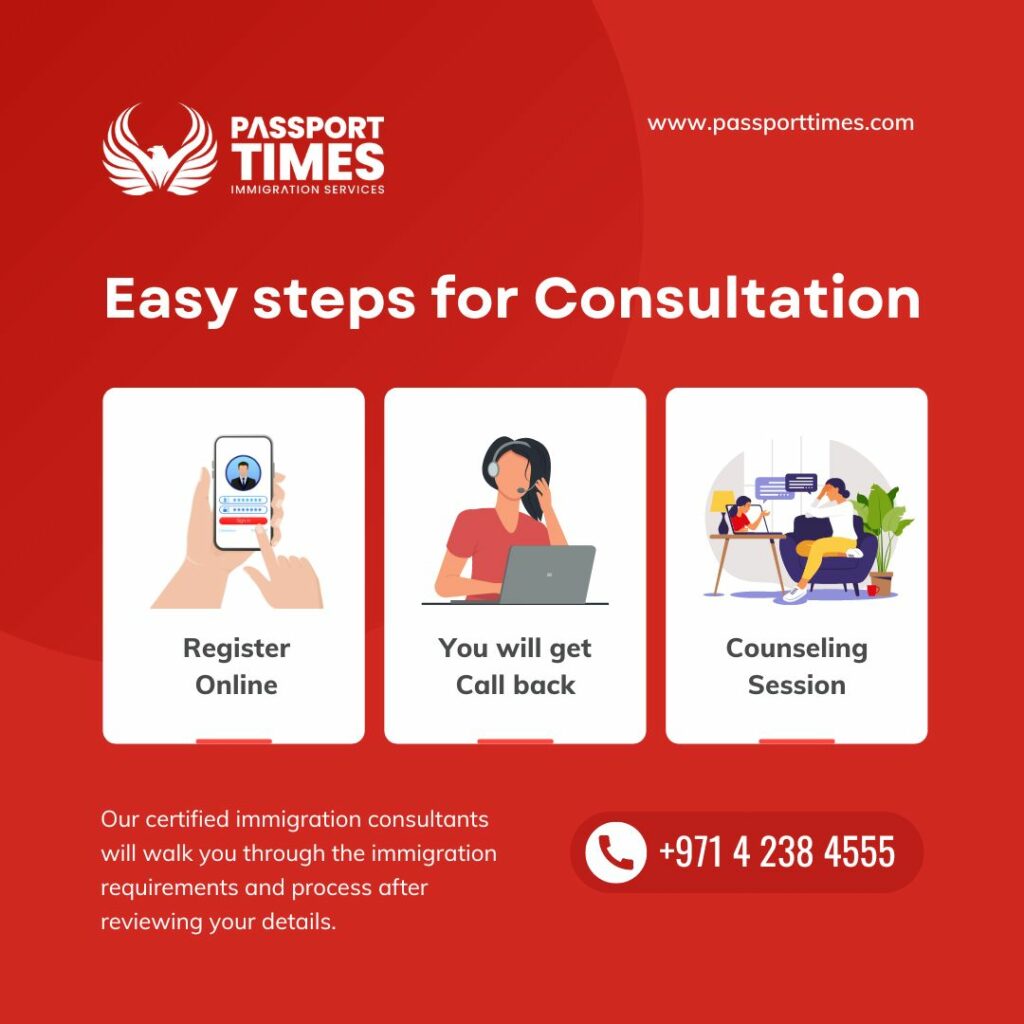- Gulf Towers, Oud Metha, Dubai
Any Questions? Call us
Looking forward to settling in Canada and building a new life?

The Skilled Worker Visa, also known as the Federal Skilled Worker Program (FSWP), is a Canadian immigration program.

Canada's Family Class category is the second largest group of immigrants welcomed into the country through its Immigration Levels Plan.

The Canadian government encourages the immigration of successful business individuals through the Business Immigration Program.

To study in Canada, international students must apply for a study permit, which serves as a student visa. We will provide an overview of the process for obtaining a Canada study visa.

To be eligible for a visitor visa, individuals must demonstrate that they have ties to their home country, such as a job or family, that will ensure their return.

The process may vary depending on the type of work visa you are applying for and your individual circumstances. However, the general process is as follows.
Immigrating to Canada has been a dream for many people around the world for many years. The country is known for its high standard of living, excellent healthcare and education system, and its welcoming and diverse society.
The process of immigrating to Canada can vary depending on the category of immigration that an individual chooses to apply for. The most common categories include: skilled worker, family sponsorship, business immigration, and refugee or asylum seekers.
The skilled worker category is intended for individuals who have the skills, education, and work experience needed to contribute to the Canadian economy. These individuals are assessed based on a point system that takes into account factors such as their age, language proficiency, education, and work experience.
The family sponsorship category allows Canadian citizens and permanent residents to sponsor their family members to come to Canada as permanent residents. This can include spouses, partners, children, parents, and grandparents.
The business immigration category is intended for entrepreneurs, investors, and self-employed individuals who can contribute to the Canadian economy through their business skills and experience. Business immigrants are assessed based on factors such as their net worth, business experience, and the potential of their business to create jobs for Canadians.
Finally, the refugee or asylum seeker category is intended for individuals who are fleeing persecution, war, or other forms of violence in their home countries. These individuals are assessed based on the United Nations Convention on the Status of Refugees and the Canadian Charter of Rights and Freedoms.

It's also worth mentioning that there are Provincial Nominee Programs (PNP) which allow Canadian provinces and territories to nominate individuals for Canadian permanent residence who are interested in settling in that specific province or territory. Each province and territory has its own PNP stream with specific eligibility criteria and requirements.
In recent years, Canada has been welcoming more and more immigrants, with the goal of increasing the country's population and contributing to its economic growth. The Canadian government has also made significant changes to the immigration system to make it more efficient and to reduce the processing times for applications.
In conclusion, Canada is a great destination for immigrants. It offers many opportunities for those who are looking to start a new life, whether it is for work, study, or reuniting with family. With the right qualifications, language skills and a good plan, an individual can successfully immigrate to Canada and enjoy the many benefits that the country has to offer.
There are several reasons why an individual may choose to immigrate to Canada as a skilled worker:
1. Strong economy: Canada has a strong and stable economy, with low unemployment rates and a diverse range of industries that are hiring. This makes it an attractive destination for skilled workers who are looking for job opportunities.
2. High standard of living: Canada is known for its high standard of living, with excellent healthcare and education systems, and a safe and welcoming society.
3. Multicultural society: Canada is a multicultural society, with a diverse population that welcomes immigrants from around the world. This makes it a great place for immigrants to settle and build a new life.
4. Pathway to permanent residence: The skilled worker category provides a pathway to Canadian permanent residence. Once an individual becomes a permanent resident, they are able to live and work in Canada permanently and can eventually apply for Canadian citizenship.
5. Express Entry: The Express Entry system is an electronic application management system that is used to manage applications for permanent residence under certain immigration programs, including the Federal Skilled Worker Program, Federal Skilled Trades Program and Canadian Experience Class. It allows the applicants who meet the requirements to be ranked against other applicants in a pool and the highest-ranking candidates are invited to apply for permanent residence.
6. Provincial Nominee Program (PNP): Some provinces have their own PNP streams that are aligned with the federal Express Entry system, allowing them to nominate a certain number of skilled workers for permanent residence. This can provide an additional pathway for skilled workers to immigrate to Canada.
7. Education and job opportunities: Canada has world-class universities and colleges, which can provide opportunities for further education and career development. Additionally, Canada's diverse economy offers a wide range of job opportunities for skilled workers in different industries, such as technology, healthcare, finance, and more.
8. Family-friendly policies: Canada has policies in place that make it easy for skilled workers to bring their family members along with them, such as the Family Class Sponsorship program.
Immigrating to Canada as a skilled worker can provide an individual with the opportunity to build a new life in a country that offers a high standard of living, a strong economy, and a welcoming society. With the right qualifications and experience, an individual can take advantage of the many opportunities that Canada has to offer.
The eligibility criteria for the Canada Skilled Immigration Program, also known as Express Entry, includes the following:
1. A valid job offer or a nomination from a province or territory.
2. A minimum of 1 year of work experience in a skilled occupation (National Occupational Classification (NOC) level 0, A, or B).
3. A score of at least 67 points on the Express Entry selection grid, which takes into account factors such as age, education, work experience, language proficiency, and adaptability.
4. Proof of language proficiency in English or French, with test results from a designated testing agency.
5. A valid Educational Credential Assessment (ECA) for foreign educational credentials.
6. Proof of sufficient funds to support oneself and any dependents after immigrating to Canada.
It's worth noting that these are general criteria and specific programs may have additional or different requirements.

The Canada Skilled Migration Roadmap typically involves the following steps:
1. Determine your eligibility: Check if you meet the requirements for the Canada Skilled Immigration Program, including language proficiency, work experience, and education.
2. Create an Express Entry profile: If you are eligible, create an Express Entry profile to be considered for immigration to Canada. This will require providing information about your education, work experience, language proficiency, and other factors.
3. Receive a score: Based on the information provided in your Express Entry profile, you will be given a score under the Comprehensive Ranking System (CRS). This score determines your ranking among other candidates in the Express Entry pool.
4. Receive an Invitation to Apply (ITA): If your score is high enough, you will receive an Invitation to Apply (ITA) for permanent residence in Canada.
5. Submit an application: After receiving an ITA, you will have 60 days to submit a complete application for permanent residence, including all required documents and fees.
6. Processing of the application: The processing time for an application can vary, but typically takes around 6 months.
7. Medical examination and police clearance: Once your application is submitted, you will be required to undergo a medical examination and obtain a police clearance certificate.
8. Landing and obtaining a Permanent Resident Card: Once your application is approved, you will receive instructions on how to land in Canada and obtain a Permanent Resident Card.
It's worth noting that these are general steps and specific programs may have additional or different requirements.

To be eligible for Canadian citizenship, an individual must meet certain requirements set by the Canadian government. These requirements include:
1. Being a permanent resident of Canada for at least 3 out of the last 5 years.
2. Having filed taxes for at least 3 out of the last 5 years
3. Being able to demonstrate an adequate knowledge of English or French
4. Passing a test on Canadian history, values, and government
5. Having no serious criminal convictions.
6. Not currently under a removal order (being ordered to leave Canada)
Additionally, some individuals may not be eligible for citizenship, such as those who have had their citizenship revoked, are under investigation for war crimes or crimes against humanity, or have been convicted of certain offences related to national security.
The ease of finding a job in Canada can vary depending on a number of factors, such as the individual’s qualifications, the location, and the current job market. Generally speaking, the job market in Canada is considered to be relatively strong, with low unemployment rates and a diverse range of industries that are hiring.
However, the job market can also be competitive, especially in larger cities and in certain industries. It is important to have a strong resume and be prepared to apply to multiple job openings. Networking and building connections can also be helpful in finding job opportunities.
It is also important to note that language can be a barrier for some individuals, so being fluent in English or French is usually required for most jobs in Canada. Additionally, certain professions may require additional certification or licensing, such as doctors, nurses, engineers, etc.
Overall, it is possible to find a job in Canada, but it may take some effort and persistence. It is also a good idea to research the job market and the requirements for certain professions before applying for any job.
The Provincial Nominee Program (PNP) is a program that allows Canadian provinces and territories to nominate individuals for Canadian permanent residence who are interested in settling in that specific province or territory. Each province and territory has its own PNP stream with specific eligibility criteria and requirements.
To be invited to apply through a PNP stream, you must first express your interest in immigrating to a specific province or territory by submitting an expression of interest (EOI) through the province or territory’s online portal. The EOI is used to assess your qualifications and experience, such as your education, work experience, language proficiency, and other factors.
Once you have submitted your EOI, you will be placed in a pool of candidates and ranked based on the criteria of the specific PNP stream. The highest-ranking candidates will then be invited to apply for a provincial nomination.
You can increase your chances of getting an invitation by providing accurate and complete information in your EOI. It is also important to be aware that some provinces may require you to have a job offer from an employer in the province before you can be nominated.
It is also important to note that not all provinces and territories are participating in PNP all the time, some of them have a limited number of spots that they can nominate, and the criteria and the process can change over time, so it is important to check the official website of the province you are interested in and stay updated with the latest information.
As an Indian citizen and resident of the UAE, you are eligible to apply for Canadian permanent residence through the Express Entry program or other federal and provincial programs. However, the process for applying for Canadian permanent residence from Dubai may vary slightly from the process for applying from within India.
You will need to complete the same steps as outlined in my previous answer, such as creating an Express Entry profile, receiving a score, and submitting an application for permanent residence, along with all required documents and fees.
You will also be required to provide proof of your legal status in the UAE, such as a valid residence visa, and you may need to undergo a medical examination and obtain police clearance certificates from both the UAE and India.
It’s worth noting that Canada’s immigration policies and procedures are subject to change, so it’s always recommended to check the latest information from the Government of Canada’s immigration website or consulting with an immigration lawyer or authorized immigration consultant for more specific and up-to-date information and guidance on the process.
The International English Language Testing System (IELTS) is one of the approved language proficiency tests for the Canada Skilled Immigration Program (Express Entry), but it is not the only test accepted. The other tests are the Canadian English Language Proficiency Index Program (CELPIP) and the Test d’évaluation de français (TEF).
Language proficiency is one of the factors that are considered in the Express Entry selection process and you will need to provide test results as part of your Express Entry profile. The minimum score required for the IELTS (General Training test) is CLB 7 in all four language abilities (reading, writing, listening and speaking), while CELPIP score required is at least 4L in all four language abilities.
It is important to note that the test results must be less than two years old on the day you submit your Express Entry profile. Also, the scores you get in the language test will affect your overall score in the Comprehensive Ranking System (CRS) and the higher the scores, the higher the chances of getting an ITA (Invitation to Apply) for Permanent Residence.
In summary, while IELTS is one of the accepted tests, it is not mandatory and you can choose to take any of the other approved tests.
The Canada Skilled Immigration Program, also known as Express Entry, is a federal government program that manages applications for permanent residence for skilled workers. Candidates are ranked based on a points-based system, with those scoring the highest given priority for an invitation to apply for permanent residence.
The minimum work experience required for the Canada Skilled Immigration Program is one year of full-time (or equivalent part-time) paid work experience in a skilled occupation within the last 10 years.
The minimum language proficiency required for the Canada Skilled Immigration Program is Canadian Language Benchmark (CLB) 7 for each language ability (speaking, listening, reading, and writing).
The minimum score required for the
The steps to apply for the Canada Skilled Immigration Program include: determining eligibility, creating an Express Entry profile, receiving a score, receiving an Invitation to Apply (ITA), submitting an application, undergoing medical examination and police clearance, and obtaining a Permanent Resident Card.
Skilled Immigration Program is 67 points on the Express Entry selection grid, which takes into account factors such as age, education, work experience, language proficiency, and adaptability.
The processing time for an application can vary, but typically takes around 6 months.
Yes, you can apply for the Canada Skilled Immigration Program while staying in another country, but the process may vary slightly and you may need to provide proof of your legal status in that country, such as a valid residence visa, and may need to undergo a medical examination and obtain police clearance certificates from that country as well.
Choose the Country You Want to Settle
Enter your email address to get latest News, updates and offers from Passport Times.
Hello!!! 👋
Welcome to Passport Times!
How can we assist you? Looking for anything specific?


